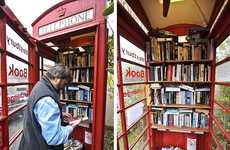
Street Books Delivers Literature to Portland's Homeless
Michael Hines — August 19, 2011 — World
References: streetbooks.org & planetcustodian
Portland-based artist/writer Laura Moulton is the genius behind Street Books, a mobile library for the homeless. Street Books offers those who live on Portland's streets the opportunity to read everything from classic titles to modern hits.
Fun fact: to get a library card you must have a proof of address. Since the homeless don't have an address, they cannot get a library card and thus the need for Street Books. Moulton uses a card catalog to keep track of who checks out what and a return policy that makes heavy use of the honor system. Moulton is not paid for operating Street Books but does accept donations in the form of new books. In addition to books, stories and photos of patrons are also collected and published on Street Books' website.
Fun fact: to get a library card you must have a proof of address. Since the homeless don't have an address, they cannot get a library card and thus the need for Street Books. Moulton uses a card catalog to keep track of who checks out what and a return policy that makes heavy use of the honor system. Moulton is not paid for operating Street Books but does accept donations in the form of new books. In addition to books, stories and photos of patrons are also collected and published on Street Books' website.
Trend Themes
1. Mobile Libraries - Distributing books and literature to underserved communities through mobile libraries presents opportunities for reaching new audiences and increasing literacy rates.
2. Honor System - Implementing an honor system for library checkouts can remove barriers and increase access to books for those without a permanent address or proof of residency.
3. Community Publishing - Collecting and sharing stories and photos of library patrons creates opportunities for community-building and amplifying diverse voices.
Industry Implications
1. Public Libraries - Public libraries can explore the concept of mobile libraries to reach and engage with underserved populations and improve literacy rates in their communities.
2. Nonprofit Organizations - Nonprofit organizations can establish and support mobile libraries to address literacy and educational gaps in underserved communities.
3. Publishing - Publishing companies can collaborate with mobile libraries to provide books and resources to underserved populations and promote reading culture.
2.3
Score
Popularity
Activity
Freshness























